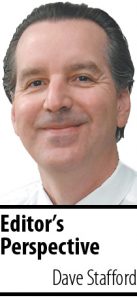Subscriber Benefit
As a subscriber you can listen to articles at work, in the car, or while you work out. Subscribe Now“I would like to be remembered as a person who wanted to be free … so other people would be also free.”
— Rosa Parks
 Rosa Parks sat down and would not be moved, but that did not make her legacy. What transformed her simple act into an abiding human lesson taught to generations of schoolchildren was why she would not be moved. By sitting, she stood up to an unjust system that had oppressed her and generations before her solely because of the color of her skin. She got into what the civil rights marcher and later congressman John Lewis called “good trouble.”
Rosa Parks sat down and would not be moved, but that did not make her legacy. What transformed her simple act into an abiding human lesson taught to generations of schoolchildren was why she would not be moved. By sitting, she stood up to an unjust system that had oppressed her and generations before her solely because of the color of her skin. She got into what the civil rights marcher and later congressman John Lewis called “good trouble.”
I can never walk in the shoes of Rosa Parks, John Lewis or any other person of color, civil rights hero or not. But I can learn and empathize, open my heart and advocate for a more just nation.
Parks was no lawyer, but her simple act and those of countless others inspired in lawyers the greatest movement for social change and equality this nation has seen. Longtime attorney and law professor Kent Hull chronicles the legacy of some of those legal giants in an excellent guest column here.
Through lawyers, we have progressed toward the more perfect union we like to claim is our birthright as Americans. But progress toward equality has come in fits and starts and setbacks over the past century. For every lawyer who fought for civil rights, justice and equality, another backed by an establishment fought them. For every Justice Thurgood Marshall, a Chief Justice Roger Taney haunts our history.
Valiant and well-meaning laws like the Civil Rights Act and the Voting Rights Act attempted to ameliorate our evil legacy of slavery and repression. But for the good these laws did, they were too often met by clenched fists rather than open hands. Where we should have proceeded to abolish the Electoral College as Indiana Sen. Birch Bayh nearly accomplished 50 years ago, we slowly turned against the ideal that we all have voices that matter equally at the ballot box.
Voter ID laws in Indiana and elsewhere raised unwarranted and discriminatory — but intentional — bars to the polling place. Citizens United’s legal fiction that money is speech granted a newly entitled political class unfettered privilege and endless oceans of cash to lord over our civic life. The result has been a coarseness straining the ties that bind us, dividing us into warring tribes who cannot even agree on the clear results of an election. Profligate “media” are incentivized to spread dangerous lies.
Meantime, a few lawyers have gone to court since Donald Trump lost, attempting a legal coup arguing that 74 million is greater than 81 million. By no coincidence, the votes these lawyers seek to disqualify — to vilify — are almost without exception those cast by Black voters.
Our independent judiciary, our co-equal third branch, has held, properly throwing out these treacherous lawsuits. But our nation has been damaged. So, too, has the legacy of the lawyers and lawmakers who chose to join these misguided attempts to subvert the votes of Americans. Respectfully, just who the hell do they think they are?
This column will publish Jan. 6, 2021. Vice President Mike Pence is scheduled to preside over a joint session of Congress that day to count the votes of the Electoral College, wherein Joe Biden will be formally elected president. This is usually a ceremonial affair, but as I write this ahead of deadline, I worry. American democracy, such as it is, is under attack from within. So nothing would surprise me.
I do take comfort, though, knowing the American rule of law, such as it is, stands because men and women of goodwill guard it. For those who do, thank you. For those who use the legal system to undermine our institutions, actions have consequences, and people have memories. Our legacies are simply what we do and what we don’t. What more do we have, really?•
• Dave Stafford — [email protected] — is editor of Indiana Lawyer. Opinions expressed are those of the author.
Please enable JavaScript to view this content.
